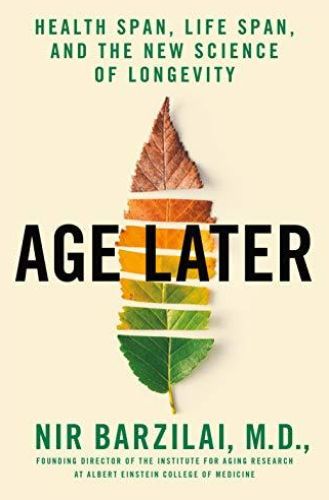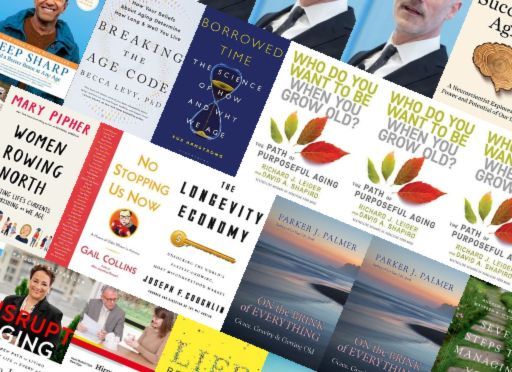Nir Barzilai, MD, founding director of the Institute for Aging Research at the Albert Einstein College of Medicine, offers an overview of science and technology that might extend a healthy life span.

Not Dead Yet
Nir Barzilai, MD is the founding director of the Institute for Aging Research at the Albert Einstein College of Medicine. He addresses the widespread, mistaken assumption that aging and its depredations are inevitable. He states the obvious when he says that living to a great age has always been desirable, but poor health often afflicts people’s final years. The author is confident that contemporary knowledge and expertise may enable people to live longer while remaining healthy and active. He runs down the manifestations of this knowledge and expertise. For example, Barzilai cites new treatments and drugs that identify and may curtail aging’s causes and increase people’s “health span.” He asserts that people should prepare to live healthy lives into their 90s and beyond.
I’m not yet convinced that they will change the face of aging, but I want to make the point that some of the ‘crazy’ things being pursued might be crazy enough to work. Nir Barzilai
Library Journal summed up Dr. Barzilai’s work well when it opined, “a thoughtful take on aging that should be of interest to all concerned with the overlap between health and aging.” And an author plowing the same fields as Dr. Barzilai – David A. Sinclair, PhD – author of Lifespan: Why We Age? and Why We Don’t Have To – said, “Dr. Barzilai is the only person in the world who could have written this remarkable book. Not only is he a world leader in aging research, but he also happens to be one of the best science communicators on the planet.”
Readers seeking companion volumes on this subject might enjoy Dr. Sinclair’s book as well as Keep Sharp by Sanjay Gupta or Stop Aging Now! by Jean Carper.
Everyone Ages
Dr. Barzilai reminds readers that for much of human history, anyone older than 40 was regarded as elderly. Now, in developed nations, people routinely live to 80.
Aging transforms us, remakes us, breaks us, destroys us. But why? Nir Barzilai
To extend people’s life span and quality of life, Barzilai says, medicine must focus on “age-related illnesses.” He explains that geroscientists examine the connection between getting old and the illnesses that age causes and that they collaborate with scientists who examine the underlying causes of aging and specialists focusing on the aged’s quality of life.
People’s bodies, even at the cellular level, wear out and break down like machines. Thus, Barzilai underscores common wisdom when he says that to slow aging you should exercise, neither eat nor drink to excess, and maintain your friendships and overall sense of purpose.
Yet, a major factor in aging remains unaddressed – genetics. All animals become more vulnerable to illnesses as they age, the author asserts. He believes that contrasting the aging process in animal species with that of people who live healthily into their 90s and beyond might unlock the secret of aging slowly.
Aging’s Biological Causes
Dr. Barzilai notes that no scientific evidence proves that ingesting human growth hormones prolongs youth. Growth, he writes, demands huge amounts of energy. When growth stops early, an animal lives longer, and science has found that animals with lower growth hormone levels live longer than those with higher levels.
The author offers a set of “hallmarks of aging,” including “senescence,”when cells stop dividing and functioning; “inflammation,” indicating problems in the body’s efforts to heal itself as it breaks down; and “immune dysfunction,” a reduction in the immune system’s effectiveness in responding to assaults from pathogens.
As geroscientists continued researching aging and longevity, we were convinced that the biological processes that drive aging in humans could be targeted.Nil Barzilai
Barzilai describes how geroscientists are seeking a pharmaceutical solution to one or more of these hallmarks. Among existing drugs, the author believes the top candidate is Metformin, which doctors prescribe for type 2 diabetes.
Barzilai warns that by 2050, more than 400 million people will be older than 80. He reveals that governments, as well as health care and human services providers worldwide, are seeking ways to deal with the economic and human impact of large numbers of people suffering chronic, age-related illnesses.
The author explains that when people live longer, healthier lives, society incurs fewer individual and collective costs than it faces when people die of disease, even if they are younger. He posits this as good news for societies concerned about the medical expenses aging populations might incur.
Barzilai discloses that new technologies and “designer drugs” identify and can treat aging’s underlying sources. He believes that pre-teens today may eventually know their great and even great-great grandchildren.
A Shallow Overview
Dr. Nil Barzilai stretches a pretty compelling magazine article into a fairly interesting book, though it offers no great revelations or surprises. Especially, it does not, in fact, explain how you might age later. Barzilai deals in contemporary science and a great deal of conjecture, while now and then covering medical history and at times relying on statistics to make his points about longer life and a longer “health span” – a handy phrase referring to living well for longer. As he repeatedly points out, living to, say, 115, would be less than desirable if you’re in ill health for, say, the final 20 years.
Barzilai is a competent writer with unique expertise. Those fascinated by the issues surrounding aging and its likely medical solutions will find a lot to consider, all on the layperson level. In that way, Barzilai seeks to popularize esoteric science and in that, he succeeds.







